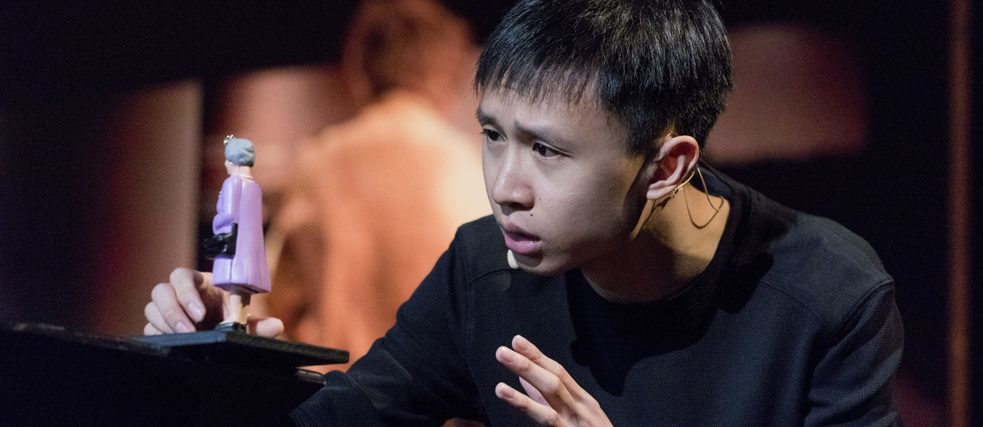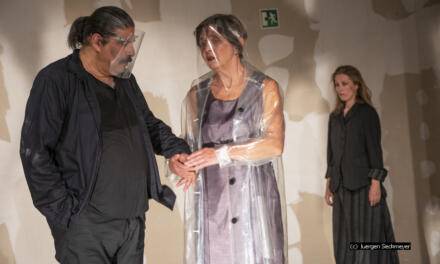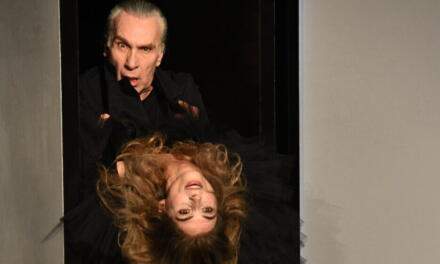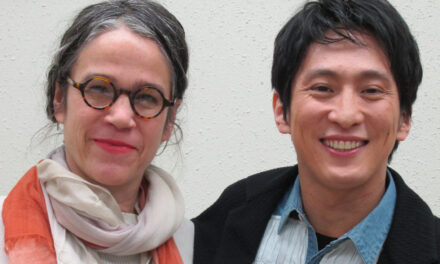With the Shifting Perspectives platform, the Berlin Theatre Meeting brings a selection of the best German-speaking countries into dialogue with international voices from marginalized communities. The second edition of the platform has gathered together enriching guest performances on issues such as post-colonialism and Afrofuturism.
The wax figure of the anthropologist Charles Le Roux gazes at a river panorama. Members of an indigenous people, called “pygmies” in Le Roux’s day, can be seen in their boat. The picture was taken in the course of an expedition to New Guinea, which the Dutch and Americans undertook together in the 1920s. The Americans also shot the documentary film By Aeroplane To Pygmyland (1926), image production inspired by the imperial spirit of the era.
What fascinated the artist and theoretician Ho Rui An about the wax figure he found in the Amsterdam Tropical Museum is one of its particular details: the dark shirt on the figure’s back, which looks very sweaty. The tropical climate must have been uncomfortable for the white man. This idea inspired the Singapore-based Rui An to undertake a colonial history of sweat, which he presents as a lecture performance under the title Solar: A Meltdown. In a sweeping arc, supplemented and illustrated by several film examples, he examines “the sun as the last frontier of the imperial project,” illuminating the links between “heliophobia and xenophobia.”
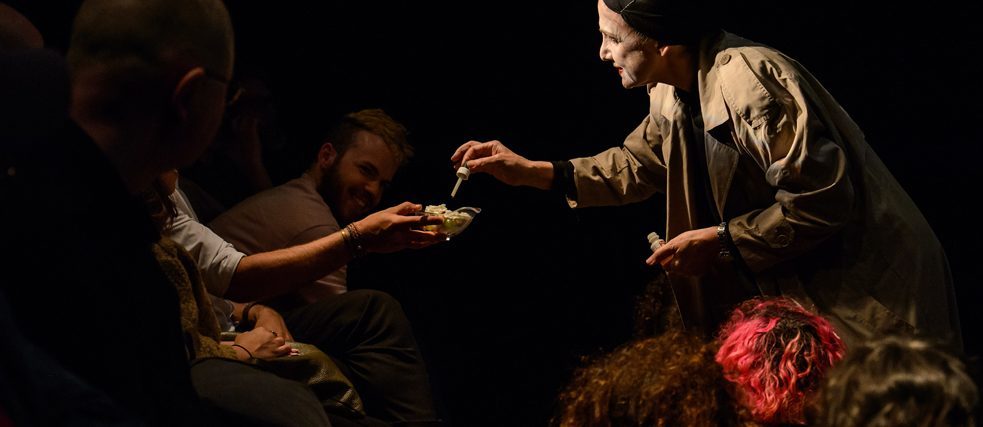
Jogging–Theatre in Progress by the actor and theatre-maker Hanane Hajj Ali from Lebanon | © Piero Chiussi
SURMOUNTING THE WALLS OF TODAY
Solar: A Meltdown was on view at the Berlin Theatre Meeting 2018 at the second edition of the platform Shifting Perspectives, established in 2017 to open the view beyond the German-speaking world and “bring other voices into dialogue with the festival,” as its curator Necati Öziri puts it. An international guest performance platform, thematically interwoven with the discussion series TT Context: UNLEARNING History, which the Theatre Meeting realized in cooperation with the Federal Agency for Civic Education, the format brings together six performances from Israel, Lebanon, Brazil, Nairobi, Johannesburg, and Singapore.
The dramaturg Daniel Richter, temporary director of the Theatre Meeting 2018, recurs to the beginnings of the festival in the Cold War era when, with a selection of ten notable productions from the German-speaking world, the Theatre Meeting sought to widen the view beyond the Berlin Wall. Now, in the age of globalization, says Richter, Shifting Perspectives raises the question: “What are the new walls of today?” The idea is that the guest performances, whose selection is not based on a best-of or competition concept, should conceive “counter-stories” and also point out the areas of representation that remain empty in the local cultural sector.
BEING BLACK IN TRANSITION
“I’m only invited to talk about being black,” notes a performer of the Companhia Brasileira de Teatra at the start of the performance Preto. Based on the situation in her own country–”Brazil is black, even if it doesn’t admit it”–the group is designing a multi-level and universal game of attributions and discriminations, while never losing sight of the interaction between race, class, and gender.
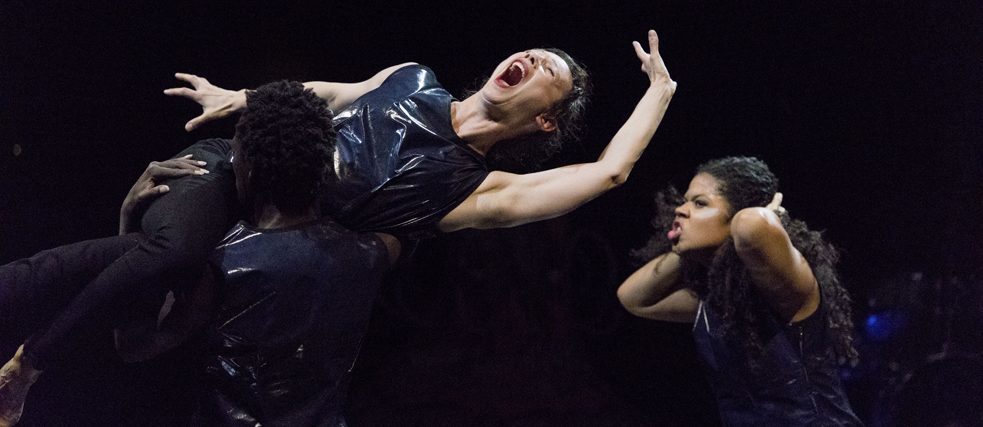
The African-European The Jitta Collective attempts to rethink the heritage of cultural appropriation in Chombotrope | © Eike Walkenhorst
Dependency relationships and fragile constructions of identity are negotiated in interview excerpts, choreographies and even sequences from Rainer Werner Fassbinder’s play The Bitter Tears Of Petra Von Kant, all of which culminates in a scene in which the performers wear oversized papier-mâché heads bearing their own likenesses. Inspired by the essay Critique Of Black Reason by Achille Mbembe, Preto poses the question of what a self-confident blackness, which does not orient itself to the projections of a white majority society, could look like today.
Drafting black self-images is also part of the International Co-production Fund’s Chombotrope, a fusion of fashion show, lecture, and voguing (the dance style that emerged in Harlem’s gay subculture in the 1980s). The Jitta Collective, an African-European group based in Nairobi and Cologne, plays through possible future identities, above all in the presented costumes. Using industrial materials and robotic design, they stage an Afrofuturism that exists as more than science fiction literature.
PINK MONEY AND ITS PRICE
According to Julia Hanske, Head of the Department of Theater and Dance at the Goethe-Institut Headquarters, which supports the platform, the intention is to reach target groups other than those typical of the Theatre Meeting and make “international collaborative work processes” better known to the public. The predominantly young and very diverse audience attending the events shows that the intention tallies.
The influx of a new audience is particularly striking when lecture mixes with party concerns with amusement. In accord with the title, Pink Money, a queer performance by artists from Germany and South Africa, is about the purchasing power of the global LGBTI community, which is targeted as an economic factor in tourism even by countries that are not automatically associated with liberality. In Cape Town, for instance, a Mecca of the queer community, only those who have a good deal of “pink money” can move about safely in the teeth of the violence-producing social conditions. Between high-energy beat pads by DJ Mbali Mdluli, the performance sheds light on the tension between self-empowerment and imposed restraint.
THINKING ABOUT THE PUNKAHWALLAH
In general, Shifting Perspectives offers a platform for a range of topics which the Goethe-Institut also deals with in other contexts. This includes the question of how a postcolonial museum of the present and the future should be designed. On the African continent, the subject is currently being discussed under the auspices of the Goethe-Institut Namibia, in the project series “Museum Talks.”
The overcoming of colonial patterns is, of course, a task that must begin with the hegemonic powers themselves. This is particularly evident in the lecture performance Solar: A Meltdown. Ho Rui An uses the concept of “critical whiteness” as a toolkit to penetrate into the patriarchal and imperial structures that still exist in the exploitative relationship between the West and other countries, even if today in a different guise than before. This becomes especially tangible in the figure of punkahwallah. The designation was used in India and Pakistan to refer to servant workers whose job was to operate a fan by hand or foot to cool, at least temporarily, the perspiration of the white colonial rulers.
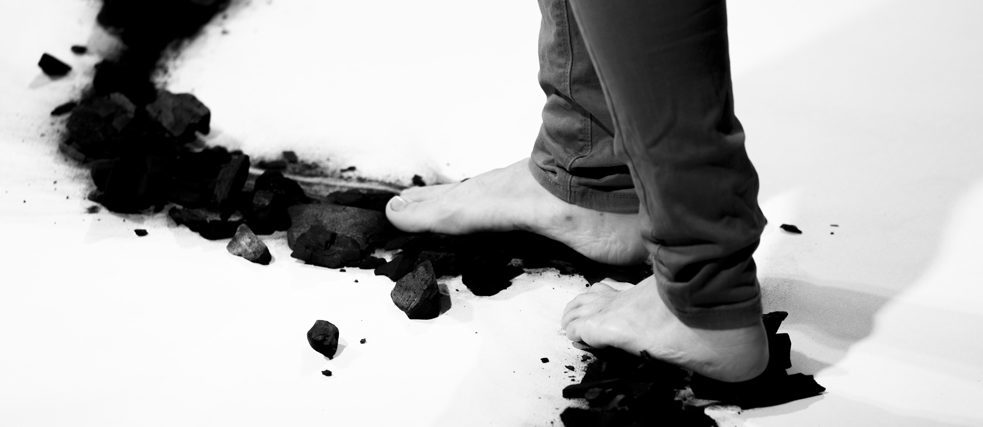
SurFace by Nofar Sela from Tel Aviv | © Eike Walkenhorst
Translated by Jonathan Uhlaner
This article first appeared in Goethe Institut on October 20, 2018, and has been reposted with permission.
This post was written by the author in their personal capacity.The opinions expressed in this article are the author’s own and do not reflect the view of The Theatre Times, their staff or collaborators.
This post was written by Patrick Wildermann.
The views expressed here belong to the author and do not necessarily reflect our views and opinions.

